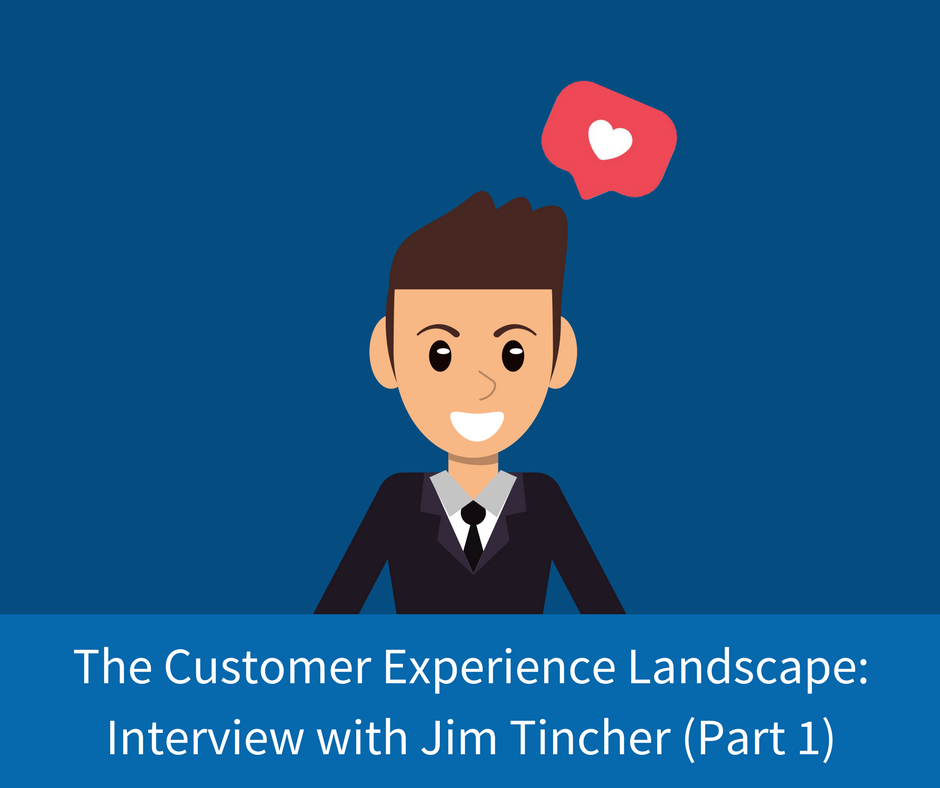Customer Experience: An Interview with Jim Tincher (Part 1)
We recently sat down with Jim Tincher, founder of Heart of the Customer and Certified Customer Experience Professional (CCXP), to get his take on the...
4 min read
Mary Dubrule August 22, 2019

Guest post by Jim Bass, Designing the Difference
Many businesses today want to deliver customer experiences which create intense loyalty and satisfaction. It’s great to see businesses taking steps to start listening to the voices of their customers and employees as a way to understand the current experiences and to define and prioritize improvement initiatives. Finding those experience-changing insights starts with a commitment and desire to ask and listen to customers’ perspectives, opinions and suggestions.
Surveys, advisory boards, interviews, and focus groups are great ways to collect critical feedback. Regardless of the tool and method, nothing beats a good, old-fashioned conversation with 2-way dialogue to demonstrate active listening and empathy. These conversations build relationships and uncover the details needed to improve or maintain those touch points that are critical to the overall experience.
Listening is the first step to improving customer and employee experience. Life in the 21st century is chocked full of surveys and requests to identify preferences, rate or rank experiences, and assess the likelihood to recommend a company. The survey mentality seems to hit all age groups and walks of life. As a result, companies have amassed an incredible amount of data from their customers.
Do you remember in elementary school when you “liked” someone a lot? We used to send/receive notes that said “I love (or like) you. Do you love me? Check yes or no.” And we even drew little checkboxes so the object of our affection could easily answer the question. Fast forward to 2019 where my 10-year-old daughter told me they pass these kinds of notes, but the question is presented with a millennial twist. She told me they ask “On a scale from 1-10, how much do you like me?” We all seem to be obsessed with knowing the score. Ironically though, surveys have become so prevalent that we have also become a bit annoyed with them at the same time.
Does all this asking and listening and knowing the score actually improve customer experience? The short answer is “no”. To really harness the power of customer feedback, opinions and suggestions, businesses need to take action on that feedback and communicate it broadly to the customer base and employees. I like to use the following story to illustrate this, especially as it relates to surveys and taking action.
Let’s say you visited a hotel for a short stay on a business trip. After you checked out you received a survey asking about your stay. You answer the survey during your flight home and gave a decent satisfaction score and left an improvement comment that the towels were becoming threadbare and there was a strange smell in the room when you first entered it. The hotel staff were “Johnny on the spot” and called you personally within 24 hours. They apologized, expressed appreciation for choosing them and they promised to improve the items you mentioned. All seemed well.
You visit the hotel again in 6 months for another short business trip. As you enter the room you immediately notice that one of the trash cans is full and then you see the same threadbare towels. You report both to the front desk and they empty the trash can and bring in new towels, but when you use the towels you see that that replacement towels are not much better than the originals. At the end of your stay you receive another survey, but this time your satisfaction level is much lower and you include some rather pointed commentary and criticism. They didn’t take action on the items you mentioned during your first stay. But, once again, they call you in 24 hours to apologize and thank you for staying with them. The used empathetic words and assured you the next time will be better.
Six months later you visit again. This time you go straight to the towels. Yep! No change. And now you notice the trash can, a smell in the room, stains on the carpet, etc. You have become hypersensitive to everything now. After all, you’ve sent 2 surveys and participated in 2 conversations where they closed the loop and promised to correct the things that prevent you from having an awesome experience. Will you complete the next survey? If you do, what will you say? Will you come back to this hotel if you don’t have to?
This hotel story is a good example of what happens with many surveys that you and I submit. We spend valuable time filling out a survey providing valuable experience feedback, we participate in closed loop conversations which give us hope for a better experience, and then we become disappointed when the improvements are not delivered. As a result, relationships dissolve or do not form, satisfaction is not achieved, and loyalty is not realized. It’s easy for businesses to blame the survey process and the closed loop process, but the real problem is that no one took action. And even worse, action was promised but never attempted.
Why wasn’t action taken? It would seem that purchasing towels would be an easy action to take. The truth is that it is not always easy to take action, especially in large companies and franchises. For a large hotel chain, towels are probably purchased and replaced based on a schedule or based on the availability of budgeted funds. The main culprit here, though, is probably a lack of coordination of information between the closed loop owners and the business managers and owners. The closed loop owners should have let the business owners know of the commitment they made to improve the experience (better towels). If the business could not meet the commitments, then the customer should have been provided a status before their next stay.
Hypothetically speaking, this was also an opportunity to “wow” you. How cool would it have been for the hotel to have just purchased one set of towels for you as soon as they noticed you had booked the hotel again? One small expense would have made a big difference and would have gone a long way to secure loyalty and create some positive word of mouth.
Taking action on feedback from customers and employees is critical to developing and maintaining relationships. It’s the basis of cultivating fierce loyalty which brings customers back to your business over and over again. Sometimes the action that needs to be taken can be as easy as:
Other times more complex changes are needed to ensure a superior customer experience is delivered consistently. Regardless of the scope, all businesses can improve customer experience by:
Read part 2: Designing Great Experiences, by guest author, Jim Bass
 Jim Bass is a Customer Experience Blogger at Designing the Difference
Jim Bass is a Customer Experience Blogger at Designing the Difference
Jim Bass is a Customer Engagement Strategist in Alpharetta, GA with over 15 years’ experience designing customer experience at key moments of truth and critical touchpoints along the customer journey map. The bulk of his experience comes from 14 years at McKesson Corporation where he led customer support and advocacy, and 3 years at ADP where he currently manages survey operations and insight analysis for National Accounts.

We recently sat down with Jim Tincher, founder of Heart of the Customer and Certified Customer Experience Professional (CCXP), to get his take on the...

Last month we shared a guest post by customer experience strategist, Jim Bass. In the first part of this two-part blog series, Jim emphasized why...

It's a common misconception that Mystery Shopping, Customer Feedback Surveys, and Reputation Management all deliver the same insights into the...